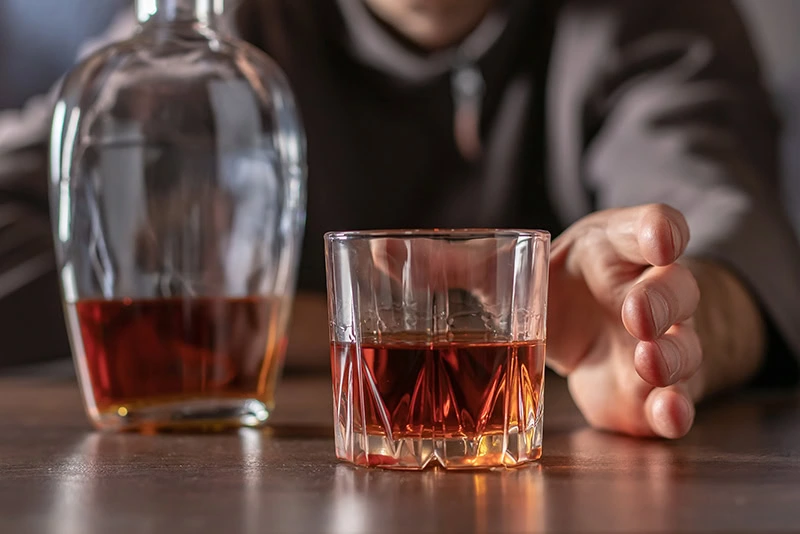Post-Traumatic Stress Disorder (PTSD) and alcohol addiction are deeply intertwined struggles that often reinforce one another, creating an overwhelming challenge for people. An estimated 13 million American adults experience PTSD every year, some of whom turn to alcohol as a coping mechanism for their symptoms.1
Unfortunately, while alcohol may provide temporary relief, it often makes underlying issues worse and leads to a cycle of dependence and worsening mental health. If you or someone you know is coping with PTSD and alcohol addiction, there is hope for recovery. Understanding the link between the two and seeking help as soon as possible are the best ways to heal.
Understanding PTSD
PTSD is a mental health condition triggered by experiencing a traumatic event. Not limited to combat veterans, PTSD affects people exposed to various forms of trauma, such as physical abuse, natural disasters, car accidents, or witnessing violent incidents. These are just some of the many forms of trauma, and it’s important to know that what might cause PTSD in one person might not do so for another.
Symptoms of PTSD
PTSD manifests through a range of symptoms, including:
- Intrusive thoughts such as flashbacks or nightmares.
- Avoidance behaviors, such as steering clear of people, places, or activities that remind one of the trauma.
- Hyperarousal, resulting in irritability, difficulty sleeping, or heightened reactions to stress.
- Negative mood changes, often involving feelings of guilt, helplessness, or anger.
- Derealization or depersonalization, which is a protective mechanism and leads to feelings of detachment.
While it’s normal for people to experience these symptoms immediately following a distressing event, people with PTSD continue to relive traumatic experiences and suffer from symptoms long after the threat has passed.2 It’s difficult to know who will be impacted by PTSD. Genetics, preexisting mental health conditions, and the severity of the trauma can all influence the likelihood of developing this disorder.

The Connection Between PTSD and Alcohol Addiction
The relationship between PTSD and alcohol addiction is complex but well-documented. Studies estimate that as many as 28-75% of people with PTSD also struggle with alcohol use disorder (AUD).3 But why is this link so significant?
At its core, the connection stems from the brain’s attempt to seek relief. Alcohol, being a depressant, temporarily numbs feelings of distress and provides a momentary escape from intrusive memories or pain. This temporary relief is known as stress response dampening, and can lead people with PTSD to turn to alcohol repeatedly, ultimately leading to dependence.4
Self-Medication and PTSD
For individuals with PTSD, alcohol often becomes an accessible and socially acceptable form of self-medication. Drinking can be used to cope with:
- Insomnia: Alcohol’s sedative qualities help individuals fall asleep, though it often disrupts the quality of rest.
- Anxiety and Hyperarousal: The calming effects of alcohol can temporarily quiet an overactive nervous system.
- Flashbacks and Nightmares: Alcohol numbs emotional responses, making traumatic memories feel less overwhelming.
While self-medication may provide short-term solace, it creates a dangerous cycle where the root causes of PTSD remain unaddressed, leading to further dependency on alcohol and worsening mental health. Drinking alcohol will never solve your trauma, but it will make everything else worse.
Treatment Options for PTSD and Alcohol Addiction
Breaking free from the dual challenges of PTSD and alcohol addiction requires a comprehensive, integrated approach. Both conditions must be treated simultaneously for effective recovery, which is known as dual-diagnosis treatment.5 Dual-diagnosis treatment options include the following.
Therapy for PTSD
There are several different types of therapy that can help people with PTSD recover and process traumatic memories. Therapy for PTSD can help address the underlying cause of alcohol use. Effective therapies can include:
- Cognitive Behavioral Therapy (CBT): Helps people identify and reframe unhelpful thought patterns related to trauma.
- Prolonged Exposure Therapy: Encourages individuals to gradually face traumatic memories and triggers in a safe and controlled manner.
- Eye Movement Desensitization and Reprocessing (EMDR): Utilizes guided eye movements to process and reframe traumatic memories.
Addiction Treatment Programs
Just because someone is undergoing trauma therapy doesn’t mean they can’t enroll in addiction treatment. In fact, there are several rehab centers that specialize in dual-diagnosis treatment. Addiction treatment options you can explore during trauma therapy and processing can include:
- Detoxification: A medically supervised process to allow the body to rid itself of alcohol while managing withdrawal symptoms. Before someone engages in addiction treatment and trauma therapy, they should consider medical detox, especially for alcohol dependence.
- Residential Treatment: Inpatient treatment facilities provide intensive care, including therapy and medical support, to individuals struggling with addiction. These programs typically offer a structured and supportive environment to help individuals recover from addiction. If you’re diagnosed with PTSD, consider enrolling in an inpatient treatment center that offers specialized, trauma-informed care or special programs, such as care for veterans.
- Intensive Outpatient Programs (IOP): A step down from residential treatment, IOPs offer a more flexible schedule while still providing support through individual and group therapy sessions. This allows people to continue with their daily responsibilities like work, school, and family while receiving ongoing treatment.
- Sober Living Homes: These are group homes for individuals in recovery that provide a sober and supportive living environment. Residents typically attend outpatient treatment or 12-step meetings while living in the home.
Medication
Medications play a critical role for people undergoing both trauma and addiction treatment. Medication can help people improve depressive and anxiety symptoms, as well as stabilize their mood. For PTSD in particular, medications like SSRIs and SNRIs, which are antidepressants, can help reduce PTSD and co-occurring disorder symptoms.6
Besides antidepressants, there are other medications that can help reduce alcohol cravings, which is essential in maintaining sobriety.7These include:
- Acamprosate (Campral): This medication helps reduce alcohol cravings and has been shown to be effective in maintaining abstinence.
- Naltrexone: Similar to acamprosate, naltrexone also helps reduce alcohol cravings by blocking the effects of opioids and reducing the desire to drink.
- Disulfiram (Antabuse): Unlike acamprosate and naltrexone, disulfiram works as a deterrent for drinking. It causes unpleasant symptoms such as nausea, vomiting, and headaches when combined with alcohol, which can serve as a strong reminder to avoid drinking.
Your treatment team will work with you to determine which medication, if any, is the most suitable for your recovery journey. It’s important to note that medication alone is not a cure for trauma or addiction. It should always be used in conjunction with therapy and other forms of treatment. Additionally, not all individuals will respond well to certain medications, so it may take some time to find the right combination and dosage for each individual.
Start Your Journey to Recovery
PTSD and alcohol addiction are powerful challenges, but they don’t define your story. At SEE Purpose Treatment Center in Bloomfield, IN, our goal is to help you heal and find hope. We offer comprehensive treatment programs that address both the physical and psychological aspects of addiction, including specialized therapy for PTSD and veterans. Our team of compassionate professionals will work with you to create a personalized treatment plan that meets your unique needs and helps you reclaim control of your life.
Whether you are struggling with PTSD and alcohol addiction or know someone who is, seeking professional help is an important first step toward recovery. With the right support and resources, including detox, inpatient treatment, and aftercare planning, you can find your purpose and build a long-lasting, sober life. Call us today to learn more about our treatment options and begin your journey towards healing.
FAQs
What is PTSD and how does it relate to alcohol addiction?
Post-Traumatic Stress Disorder (PTSD) is a mental health condition that develops after experiencing or witnessing a traumatic event, such as combat, abuse, natural disasters, or accidents. Many people with PTSD struggle with overwhelming emotions, flashbacks, or intrusive thoughts. To cope, some may turn to alcohol as a way to self-medicate and temporarily numb their pain. Unfortunately, this can lead to alcohol addiction over time, creating a harmful cycle where both conditions perpetuate and worsen each other.
Why do people with PTSD often develop alcohol addiction?
PTSD symptoms, such as anxiety, insomnia, and emotional distress, are difficult to manage without proper treatment. Alcohol is often seen as a quick fix to alleviate these symptoms because of its sedative effects. However, repeated alcohol use can lead to dependency, and excessive drinking can make PTSD symptoms worse by interfering with sleep, increasing anxiety, and impairing judgment. This toxic relationship between PTSD and alcohol ultimately makes recovery more complicated.
What are the warning signs of co-occurring PTSD and alcohol addiction?
Symptoms of this dual condition may include frequent nightmares, flashbacks, or intrusive memories alongside excessive drinking or an inability to limit alcohol intake. A person might use alcohol to avoid thinking about the traumatic event, withdraw from relationships, or have difficulty functioning in daily life due to emotional instability and substance use. If these issues persist, it’s essential to consider seeking professional help.
How is dual diagnosis for PTSD and alcohol addiction treated?
Effective treatment for co-occurring PTSD and alcohol addiction involves integrated care that addresses both conditions simultaneously. This typically includes therapies such as Cognitive Behavioral Therapy (CBT) or Eye Movement Desensitization and Reprocessing (EMDR) for PTSD, along with medically supervised detox and counseling for alcohol use disorder. Holistic approaches, such as mindfulness and stress management, are also commonly included to provide comprehensive care.
Can PTSD and alcohol addiction really be overcome?
Yes, with the proper treatment and support, individuals can recover from PTSD and alcohol addiction. It’s important to remember that recovery is a process and may require ongoing effort, but many people find renewed purpose and strength after addressing both conditions. Seeking help at SEE Purpose and following a structured treatment plan can make a significant difference in reclaiming a healthy, balanced life.
Is it possible to recover without professional help?
While it’s technically possible, attempting to recover from PTSD and alcohol addiction without professional assistance can be incredibly challenging and risky. Alcohol detox can be fatal and lead to complications like seizures or delirium tremens. It’s always best to seek help from an addiction treatment center when it comes to detoxing from alcohol. After detox, you can then seek therapy and treatment for PTSD. Recovery is a journey that requires support and guidance, and seeking professional help from luxury rehabs like SEE Purpose can help can greatly increase your chances of success.
References
- American Psychological Association. (2017, July 31). Medications for PTSD. Https://Www.apa.org. https://www.apa.org/ptsd-guideline/treatments/medications
- Medications for the Treatment of Alcohol Use Disorder. (n.d.). Office of Addiction Services and Supports. https://oasas.ny.gov/providers/medications-treatment-alcohol-use-disorder
- National Center for PTSD. (2023, February 3). How Common Is PTSD in Adults? U.S. Department of Veteran Affairs. https://www.ptsd.va.gov/understand/common/common_adults.asp
- Petrakis, I. L., & Simpson, T. L. (2017). Posttraumatic Stress Disorder and Alcohol Use Disorder: A Critical Review of Pharmacologic Treatments. Alcoholism: Clinical and Experimental Research, 41(2), 226–237. https://doi.org/10.1111/acer.13297
- Sayette, M. A. (2017). The effects of alcohol on emotion in social drinkers. Behaviour Research and Therapy, 88, 76–89. https://doi.org/10.1016/j.brat.2016.06.005
- Taylor-Desir, M. (2022). What is Posttraumatic Stress Disorder (PTSD)? Psychiatry.org; American Psychiatric Association. https://www.psychiatry.org/patients-families/ptsd/what-is-ptsd
- US Department of Veteran Affairs. (2014). Treatment of co-occurring PTSD and substance use disorder in VA – PTSD: National center for PTSD. Va.gov. https://www.ptsd.va.gov/professional/treat/cooccurring/tx_sud_va.asp




